Lead image by Amber Baldwin
Perspective through being forced off the road for the first time in over six years.
Cliché as it may be, “You don’t know what you’ve got until it’s gone” certainly applies to this period of sheltering in place, the longest my husband, Eric, and I have stayed anywhere in more than six years. In 2019, we slept at an astonishing 150 locations with our two-year-old, as we traveled full-time through three countries and 32 US states.
By early 2020, we were living out of our Jeep Wrangler at the southern tip of Mexico’s Baja Peninsula when COVID-19 began to take hold in the United States. We rushed across half a continent to my mother-in-law in Seattle, who was at-risk in a hard-hit city. We decided to move in to take care of her.
It’s been over two months, and we’re still here. The walls, smells, and city sounds have become eerily familiar. I’m not used to this. I’ve had plenty of time to reflect on our long-term lifestyle of travel, juxtaposed against life within this aluminum-sided bungalow in the middle of Seattle. If we refuse to learn from adversity, then what is it for? Here’s what being off the road has taught me about full-time travel.
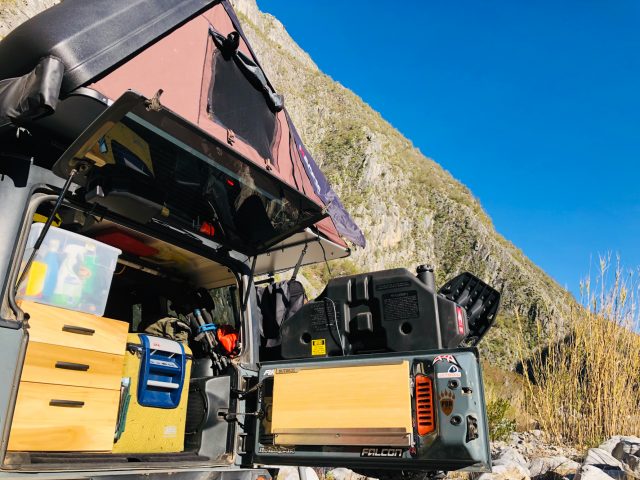

Caption: – After months of preparation, our first night in Mexico’s interior felt surreal. – In Bernal, Mexico, with one of the world’s tallest monoliths.
Stuff Is a Sad Substitute for Experience
Inside day after day, especially given the wet spring of Seattle, I’ve found myself turning to new toys and clothing items to add interest to the monotony. Normally, with limited stowage space and a budget we’d rather devote to local restaurants and activities, we’d never choose to buy so many things.
Unprecedented times call for change, but I’ve found that shopping cannot fill the void of experience through travel. I think back to a weekend spent off-roading over mountains and through rivers in Mexico’s Sierra Gorda range with a group of locals we met through an overlanding forum. We shared Sunday breakfast at an open-air restaurant owned by a hospitable couple who loved our two-year-old, even though they couldn’t communicate with him. Across the unmarked road, a colonial-era mission enveloped our view. Our generous breakfast for 11 people cost the equivalent of $53.
Money is no measure of worth, and the things Amazon delivers to my doorstep will fade from my mind years before the memories travel has gifted me.
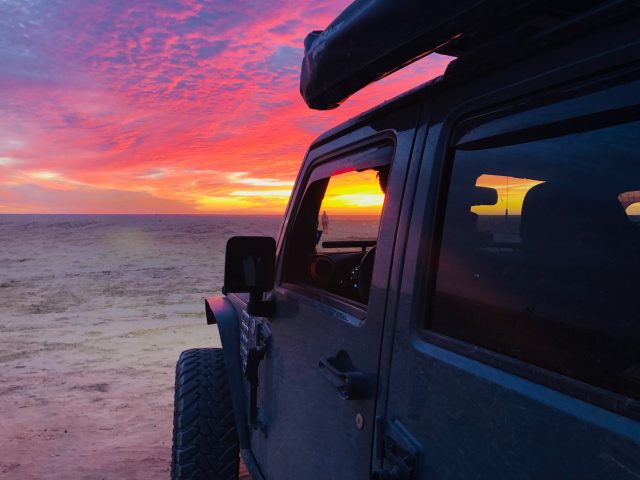
Caption: -After a baby sea turtle release in Baja, we paused for a blinding sunset.
Travel Is a Privilege
About four years into traveling full-time, we found our cadence beginning to lose its appeal. We still loved meeting new people in novel locations, and learning about the history and culture of the area we temporarily called home. But our wanderlust demanded a new challenge. This inner longing is what led us to overlanding, and ultimately selling our recreational vehicle to move into our Jeep Wrangler.
When travel is typical, like it is for us, it’s vital to remember it’s also a deep privilege. While traveling full-time doesn’t require a trust fund or even a savings account, not everyone has the luxury we do. As responsible travelers, we must consider the impact we leave as the outline of our vehicle disappears into the horizon. If we extend a bribe, then will it empower the person who accepts it? If we tip above the norm, then will the locals experience an increase in the cost of living?
Though I can leave, others must stay. What can I contribute that will better the regions I visit?
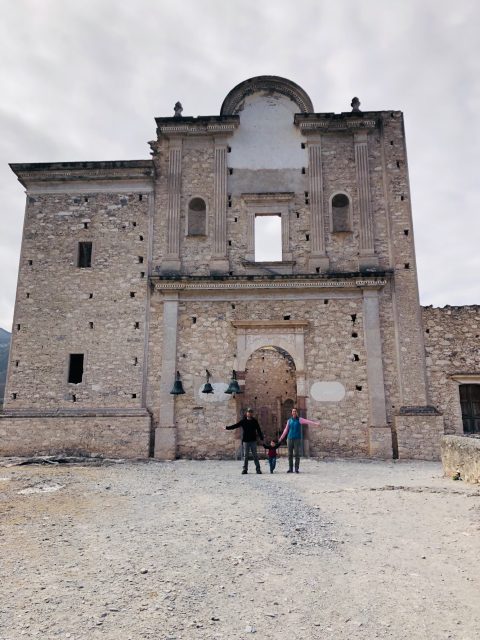
Caption: -Eclipsed by Misión de Bucareli in the Mexican state of Querétaro.
Relationships Bring Fulfillment
As an introvert, I’m usually content with the company of my husband and son. Eric, on the other hand, has devoted great effort to building and maintaining friendships as we travel because he’s an extrovert who receives energy from having a large community.
So while I wouldn’t expect sheltering in place to be too much of a sacrifice, I’m surprised by how the isolation has affected me. I especially miss interacting with strangers who become friends as we travel, like the Cambodian husband and wife in Alabama who were smitten by my friendly toddler, gave him an extra bag of donut holes from their shop, and still Facebook message me on occasion to say hi. We spent such a short time together, yet we were all touched.
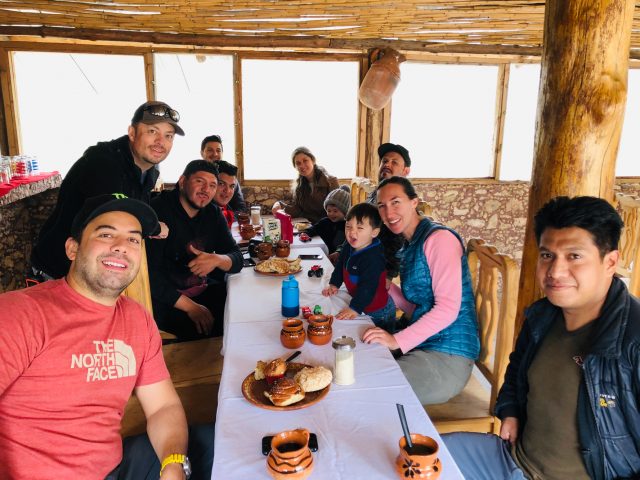
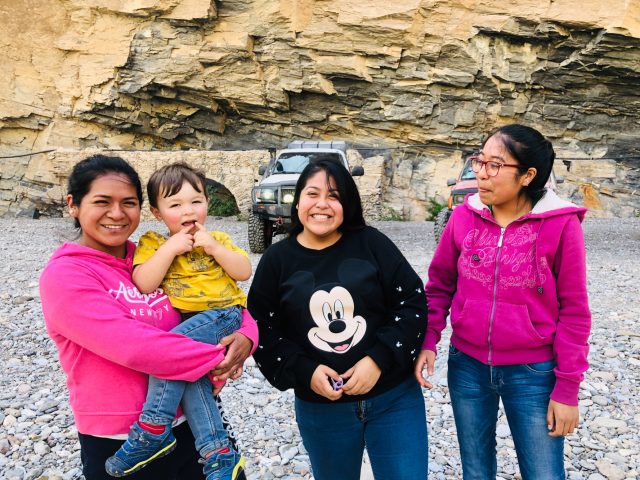
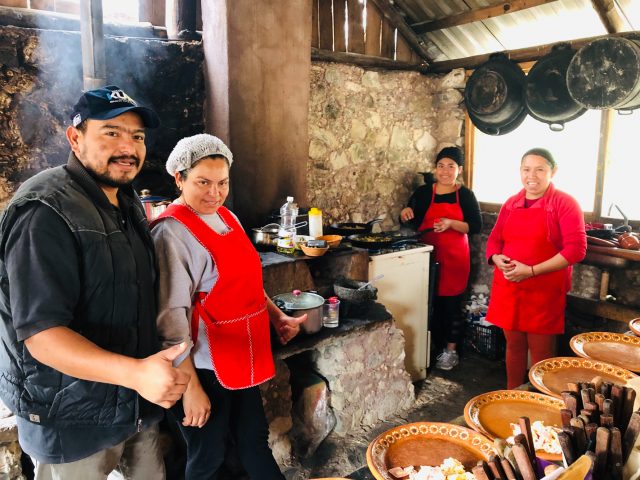
Caption: – Breakdowns and wrong turns built our friendship in Mexico’s Sierra Gorda. – Caspian makes friends wherever he goes, and common language is unnecessary. – The owners of Fonda Bucareli welcomed us to breakfast in Mexico’s interior.
The Strangeness of New Sights Enriches Us
When the walls start to close in, which has happened more than once over the past two months, I reflect on the largeness of the world and the smallness of my place in it. We were sitting on a Baja beach just within the border of one of Mexico’s national parks when a sleek DIY van rolled into the camping area. Before long, we were fast friends with Wolf and his long-time best friend, Gary.
We invited them to share a driftwood campfire with us, and they obliged with an enjoyable conversation before even having dinner. These gentlemen had done it all. I was hungry to know—to learn from them—and yet they were content to enjoy newfound friendship, asking about our dreams and toddler son who was experiencing it all with us. It was frustrating to talk about me when I wanted to ask about the Old Silk Road, about overlanding before I was even born.
Visiting new places and meeting the people in them challenges our assumptions in the most gratifying way. No one will be able to influence my son with their prejudices toward a country or its people, intellectual poverty due to the nightly news. Instead, my son will go and know a people for who they are.
Having these experiences as an adult is profoundly enriching, but I’m grateful I can raise a child within a multicultural atmosphere. This knowledge will be baked into his growing bones.
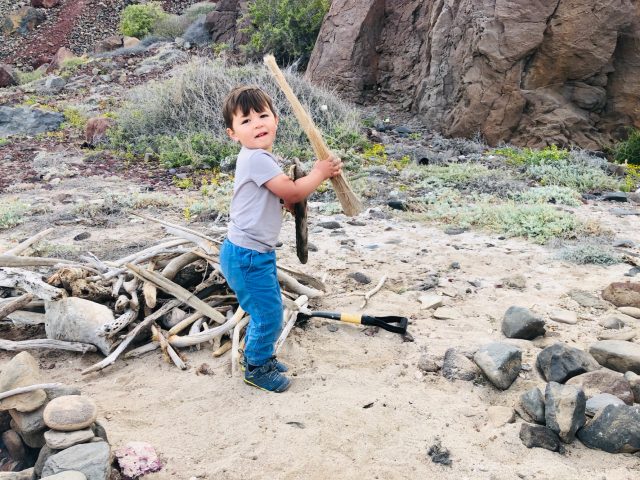
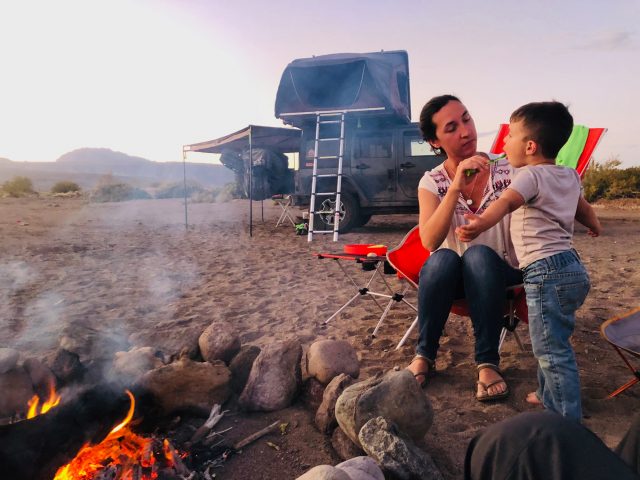
Caption: – Learning to contribute, and loving every moment. -Brushing teeth before bed on the beach of Santa Rosalía, Baja California Sur.
Novelty Is Addictive
I often say those who have wanderlust never stop having wanderlust, and must necessarily pursue the next challenge in an effort to quench their thirst. Isn’t this a fundamental element of overlanding? It’s why we explore our own country before crossing an international border, why some of us then set goals to visit a certain number of countries, and why others go on to attempt expeditions no one has ever completed.
The newness we experience through travel can be addictive. While I’m grateful for a safe place to shelter with family, I feel a desperation to get back out on the road. I miss waking up in one location, not knowing where I’m going to spend the night. It’s a small thrill to live in this way, bounding across a stage before ever seeing the set design.
Overland Travel Will Likely See a Surge
In this age of social distancing, many people will abandon means of mass transportation like airplanes, trains, and buses. I certainly am not alone in predicting a surge in overland travel, though possibly restricted to the individual’s home country in the near future.
This trend will impact those of us who already overland part time or full time, as well as each country at large. We may see our favorite camping areas overrun, flush with overnight visitors, and the trash they leave behind.
Rather than complaining, I can be proactive in two ways. First, I can arrive prepared to clean up the area. And second, I can invest in building relationships with new overlanders who could use community and the education that results.
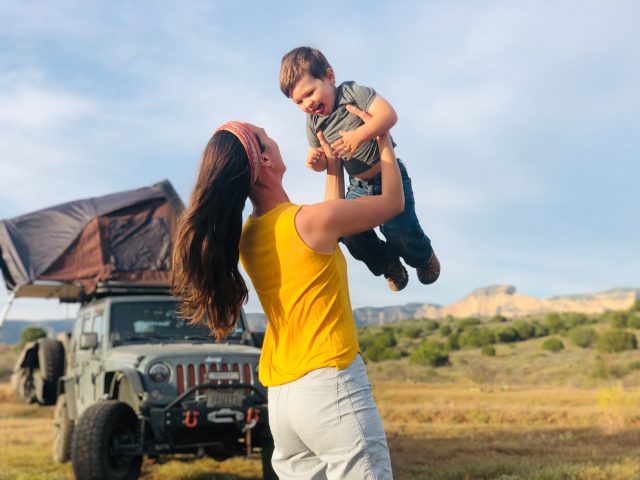


Caption: -Life is too short to wait until later. -After months of preparation, our first night in Mexico’s interior felt surreal. -Staying busy often robs us of the space we need to become.
Travel Can Be Like Running Away
“Black care rarely sits behind a rider whose pace is fast enough,” said Theodore Roosevelt, a man well-acquainted with loss and grief. Similarly, sitting still in one place has taught me I sometimes use travel to escape life’s challenges.
As a family, we are in an uncertain space of transition right now. We just sold a business that has been dear to us for eight years, but has tied us to the internet daily and impeded our international overlanding goals. The relinquishing process has been stressful and emotional. How I’d love to have the distraction of extended drives over roads I’ve never seen, fascinating conversations with strangers, and the unexpected moments I’ve become so used to.
Instead, I have a dining table workspace that never changes, where I grind through the challenges while a three-year-old comes to talk every five minutes and the television blares from the other room. I can’t escape black care, but maybe the head-on confrontation will result in the character I need for later.
Life Is Short
As of this writing, we’ve lost more than 100,000 people to COVID-19 in the United States alone, a reality that seemed to hit so many of us from behind. How do we live our lives in light of its uncertainty? Though I’ve turned to my regular habit of introspection, I mustn’t stop there, and I hope none of us do.
Our deepest beliefs become our thoughts, words, and finally, our actions. You now know a good part of what I believe, and now my life should exhibit the value I place on my family, respect for other cultures, and the sanctity of each person I meet. There are ways for each of us to live out these values and others we hold, even if we aren’t driving all over the world. But, for me, this lifestyle is what it looks like. Not just going, but teaching everyone I can about what I learn.
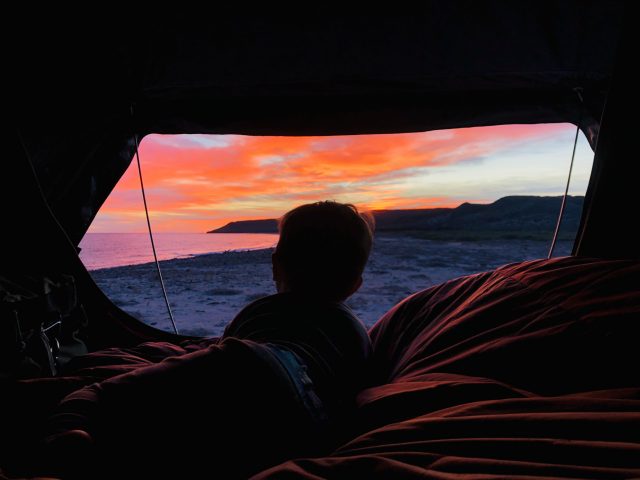
Caption: Three-year-old Caspian, looking out on Punta Chivato at sunrise.
Bio
When Brittany Highland found out people actually drive around the world, she instantly thought, “We should do that.” With her husband, she has more than six years of full-time travel behind her and a delightfully adventurous toddler. Their Jeep Wrangler took them 2,000 miles through the interior of Mexico in 2019 and the length of the Baja Peninsula in early 2020. By the end of 2020, they’ll have traveled through each of the lower 48 US states. As Brittany teaches and empowers others to challenge themselves through overland travel, the Highland family is preparing to traverse the Pan-American Highway to Argentina, then continue around the world. They intend to travel full time for the rest of their lives.



